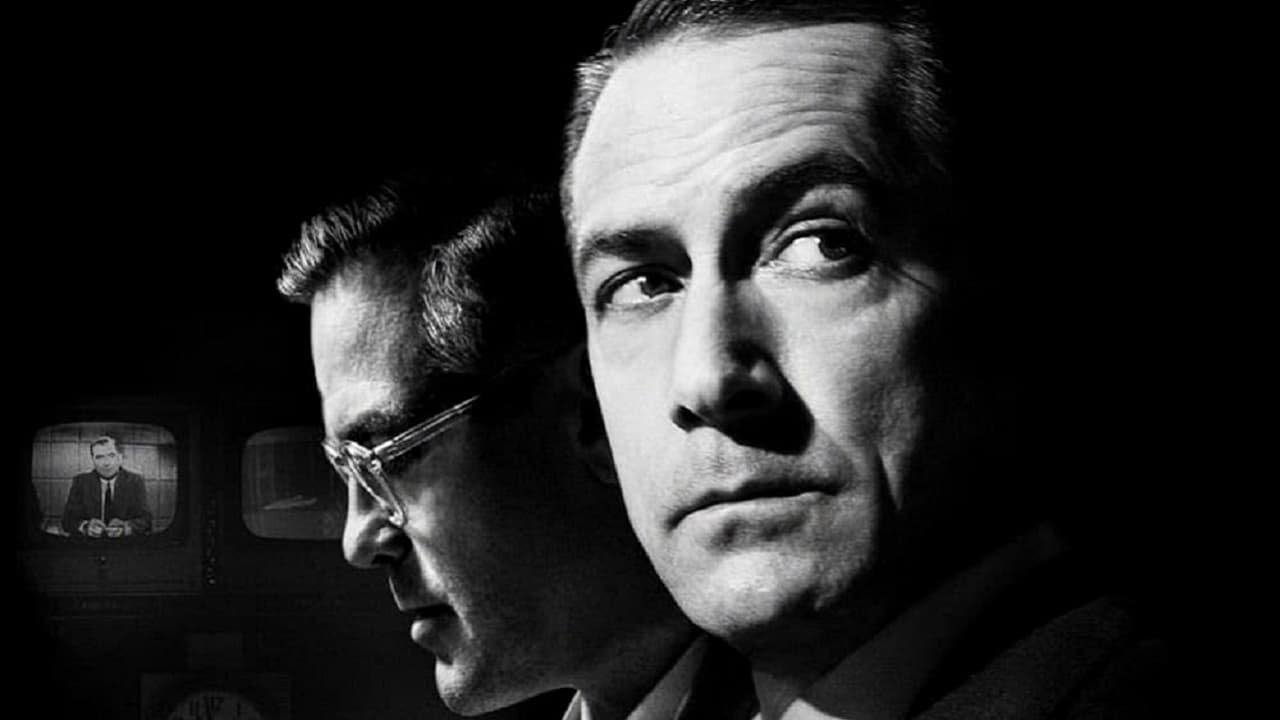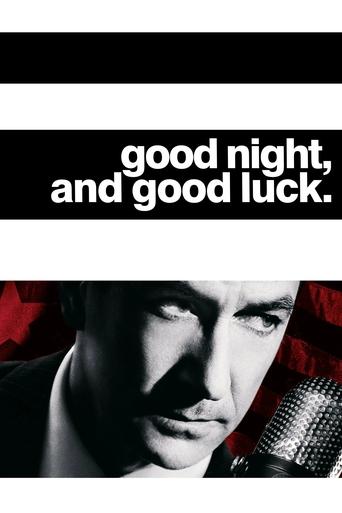



Most undeservingly overhyped movie of all time??
Clever and entertaining enough to recommend even to members of the 1%
View MoreExcellent and certainly provocative... If nothing else, the film is a real conversation starter.
View MoreAn old-fashioned movie made with new-fashioned finesse.
View MoreIn the middle of the 50's, McCarthyism reached the heights of fear and terror. It appears that it is partly due to the personality of Senator McCarthy and lines of questioning that confined to bullying and intimidation at the expense of legal procedures. Being submitted to the HUAC could make you as communist as Stalin, so no one dared to criticize McCarthy for individual safety's sake. Terror and fear were the vital components of McCarthyism, a shameful time of America's history, that was close enough to repeat itself in the 2000's for that's the way history punishes those who forget their lessons.And the main lesson we can grasp from George Clooney's "Good Night, and Good Luck" is that you can't fool everyone every time. McCarthyism crossed a few boundaries, notably when the Air Force threatened to expel a soldier if he didn't denounce his father and sister, suspected of communist inclination on the basis of revelations sealed in an envelope. So CBS 'Person to Person' host Edward Murrow (David Strathairn) felt it was time to confront the dubious methods of the Commission. This was a time where television was the new medium and Murrow was a man of no-nonsense rigid face and unflinching cigarette perfectly exuding unflappable professionalism. Strathairn gives the performance of a lifetime as a journalist who's confident, sometimes overly, but who's a pro to the core, he only consider facts and can't accept that lives would be destroyed without any substantial proof.And Murrow isn't a lone crusader for he finds support from his colleagues, his co-producer Fred Friendly (George Clooney), the CBS news executive (Jeff Daniels) and chief executive (Frank Langella). If anything, "Good Night, and Good Luck" praises the merit of team working and the solidarity driven by decency and principles. There's a moment where (before attacking McCarthy), Friendly asks the team if any of them can be accused of Communist sympathy even in the loosest way. The conclusion of this scene says it all "terror is right there in this room" and the scare of the moment was enough a reason to walk the walk. The paranoia is even induced by an interesting subplot involving Robert Downey Jr. and Patricia Clarkson, as two workers of very strange behavior, until we realize the purpose this subplot served: highlighting our own paranoia.George Clooney's retelling of the pivotal moment where America rebelled against McCarthy through the figure of Ed Murrow carries the mark of the 50's, it has a great black and white cinematography, a lot of smoking and the use of real footage of senator McCarthy complete the touch of authenticity. But the film is also a timely reminder of the value of good and honest information, it says a lot about the 50's but speaks volumes for the 2000's. Clooney has always been vocal about human rights and democracy. By choosing to tackle this subject, he reminded the audience that America has been through this, and September 11 instated a Green Scare that had nothing to envy from McCarthyism. And from the Patriot Act, it became clear that you had no other choice than proving loyalty to the flag or you were deemed as a traitor. But a good American beyond any reproach had the guts to destabilize McCarthy in the 50's, by doing his job.And "Good Night, and Good Luck" with a meticulous precision shows how the job is done, the meetings, the way they all pick quotations for McCarthy and deconstruct them. Murrow criticizes the Senator but invites him to give any refutation or correction. McCarthy's defense is to accuse Murrow of Communist sympathy. I thought that was the 'dramatic' moment where Murrow would finally take a hit. No, Murrow's next statement was nothing but brilliant. Since McCarthy didn't make any reference to all the statements made, that means he found no mistake. That's the power of Murrow, he doesn't flinch and his professionalism, empowers everyone around and it's a matter of time before McCarthy gets destabilized with the infamous "have you go no decency?", when brave people, without showing sympathy to Communism echoed this famous line of Sir Thomas More: "I would give the devil the benefit of the Law, for my own safety".It's not about McCarthy but Law.The downfall of McCarthy is a victory for Murrow but of bittersweet taste because the program will not be renewed, for lack of sponsors. And that might be another of the great lessons from such a short yet complex film. Like many movies about the 50's, ads play a significant part on TV, "Quiz Show" had Geritol, here we have Kent cigarettes and Alcoa, and as a buff of TV game shows like "What's my Line" I know that TV couldn't survive without it. So, the film rises the most important issue, one that works as a bridge between the 50's and now: if people have money to sponsors shows, if they can threaten a show to be canceled then information obviously belongs to the sponsor. It's as simple as that, and in a context of globalization, this reality gets even scarier..The movie ends with a warning, that if we take TV as just a medium for entertainment and not information, then we'll be alienated candidates for mediocrity. One can argue that Internet provided an alternative, but in a way, it also alienated us a little more and too many information are harder to control and verify so anything can be build on rumors and falsehoods. If McCarthy could use the Internet, maybe more lives might have been destroyed, he might have as well become president or someone like him.But that's a prophetic aspect of Clooney's film I don't want to venture into, it depressed me to the point I envy anyone leaving this ugly world, and if it ever happened to me, I would be tempted to tell those I love; "good night and good luck".
View MoreThis is an important subject from a historical perspective. The "red scare" era, where everyone and anyone could be suspected of being a communist simply on the basis of rumours or hearsay, and where lives and careers were ruined because of the sometimes questionable connections that were established, and which gave rise to the otherwise obscure and undistinguished Senator Joseph McCarthy, is a fascinating one. This is even a relevant movie - because to some extent the smear tactics used against communists are being used once again against Muslims today, as politicians try to make names for themselves and win elections by whipping up fear. This is an interesting subject - because it focuses on the work of Edward R. Murrow, one of the greatest reporters of all time, in standing up against McCarthy, and committing himself to bringing the man down. And yet, important, relevant and interesting though it is, this is also a pretty dry presentation.Some people liked the decision of director (and co-star, as producer Fred Friendly) George Clooney to film this in black and white. I suppose there were reasons for it. First because it gave the movie a nostalgic feel (although increasingly there are fewer people who would feel the nostalgia because black and white television isn't even in the memory banks of very many people under the age of 50.) It might be that a political point was being made - the dangers of everything being seen in black and white terms. There are good guys and bad guys and never the two shall mix. To me, and I do have some memories of black and white TV, the black and white was a distraction. It added little to the movie. Overall, beyond the black and white, I thought the story seemed to lack something in the power department. It was very low key - TOO low key for my liking. Obviously I wasn't expecting an action movie, but I was expecting something a bit more dramatic.Not that there weren't many good things about this. First, I liked David Strathairn's performance as Murrow. He portrayed Murrow as I would imagine him - a no nonsense, tell it like it is kind of reporter who's willing to butt heads with the powers that be at CBS if he has to in order to tell it like it is. That certainly led to a critique of television that truly relevant today. To what extent does TV news seek to inform, and to what extent does it exist to entertain? How powerful are sponsors in deciding what can and can't be covered? Worthwhile questions, to be sure. I also appreciated the video clips of McCarthy himself. The movie also portrayed the tragedy of CBS newsman Don Hollenbeck (Ray Wise) who became himself tainted with communism after choosing to associate himself with Murrow's attacks an McCarthy, and ended up committing suicide - although, in reality, several weeks passed between that incident and Hollenback's death.Too much was made of the relationship between Joe and Shirley Wershba (Robert Downey, Jr. and Patricia Clarkson.) Co-workers at CBS, they were also secretly married, because at the time CBS didn't allow fellow employees of the network to be married. Quaint, perhaps, but I didn't think it warranted the amount of screen time it got.
View MoreMy succinct review with no plot summary because I don't feel like putting in a whole lot of effort: Good Night, and Good Luck is definitely a well-made film. Cinematically, it is truly beautiful. The way Clooney manipulates lighting with the black and white creates some great images. That being said, I thought I would really enjoy this movie for 2 reasons. First: I love American history, especially the mid-century. Second: I am a journalism major. While really not a bad movie, I found myself dreadfully bored while watching.... it just didn't live up to my expectations. Do I regret watching it? No, but I didn't particularly enjoy the plot and the way the story was told.
View MoreSet during the reign of Joseph McCarthy's anti-communist witch hunt, Good Night, and Good Luck. is the story of CBS newsman Edward R. Murrow's public battle against the senator. Shot in a beautiful black and white, the film details the pressure put on the public to declare loyalty to the United States and denounce Communism, as well as the struggle to resist that pressure. Murrow was able to leverage his position in the media to expose the evil of McCarthy's crusade, and the film shows the lengths he and his team had to go to do that, as well as some of the contradictions and compromises involved. David Strathairn is brilliant as Murrow, and all in all the film captures the mood and explores the terms at stake in that era with clear purpose. It's also an interesting film on the question of objectivity in journalism. Murrow has a definite perspective, and yet his reporting is fair and accurate. This kind of "activist" journalism is more honest and truthful and ultimately informative than the kind of false "objective" reporting we've been conditioned to accept as the standard.
View More